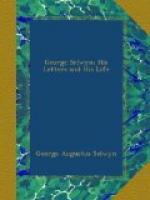I saw Horry W(alpole) yesterday for a few minutes; his distresses are, Lord O(rford’s) lunacy, and the Duchess of Gloucester’s situation if his R(oyal) H(ighness) dies, who will probably come and die in his own country. I wish these were mine, and I had no other, but we cannot choose our own misfortunes; if we could, there is nobody who would not prefer being concerned for a mad nephew whom they did not care for, or a simple Princess whom they would laugh at, si l’orgueil ne s’en meloit pas.
The great rendezvous of the White’s people has been at my Lord Cadogan’s, as that of the Macaroni’s at Lord Egremont’s. Adieu pour aujourd’hui; I need not conclude, as this letter does not go till Tuesday.
Monday morning.—At Almack’s last night: Duke of Grafton, Lord Egremont, Jack Townsh(en)d, W. Hanger, Lord March, Varcy, Barker, Hare, 2 Craufurds, Thompson, Lord North[ingto]n, Foley, Sir W Draper, Sir C. Davers, Self, Boothby.
There was no news last night, and but little play. Boothby loses regularly his 300, and, if he had a run in his favour [has] nobody to furnish him with materials to profit by it. Lady Harriot came again to fetch her husband in their vis a vis, and I crammed myself in too. I left Draper and Sir C. Davers travelling through the worst roads of Canada, Triconderaga (sic), and the Lord knows what country. But it was so tiresome that I was glad to leave them in the mud in[to] which their conversation had carried them.
Lord North (ingto) n is very sour about Lord Cov(entry)’s treatment of his sister, and talks of going to Crome to expostulate with him about it. I hope that he will not. It will do the cause no good in any respect. I am for leaving everything for the present, bad as it is, where the ill stars of them all have placed them. Cov (entry)’s mind will take another turn, and [he will] do of his own accord perhaps more than he ought.
Mademoiselle D’Eon goes to France in a few days; she is now in her habit de femme, in black silk and diamonds, which she received from the Empress of Russia, when she was in the army and at her Court as minister, A German of her acquaintance has promised Lady Townshend to contrive that she and I shall have a sight of her before she goes. She met her grandson coming to town in a chaise and four, ventre a terre, from Brighthelmstone; he dined with us. Storer’s attachment at present, as he says, is to Lady Payne. O’Brien gets 9,000 pounds a year, and the title, by Lord Inchiquin’s death.
The absence of Lord Carlisle as a Commissioner to America caused a break in the correspondence. Selwyn was much abroad during his friend’s absence, and the distance between England and America was prohibitive of letters frequent. Two, however, from Paris in 1779 give an insight into Selwyn’s life abroad. He resumed the correspondence in 1780. He was not well; he was being pressed to go to “that abominable town” of Gloucester. He hated electioneering, but it is from Matson that the next letter, in the midst of the General Election of 1780, is dated. He lost his seat—perhaps not without regret—for he returned to the less irksome representation, if such it could be called, of Ludgershall.




